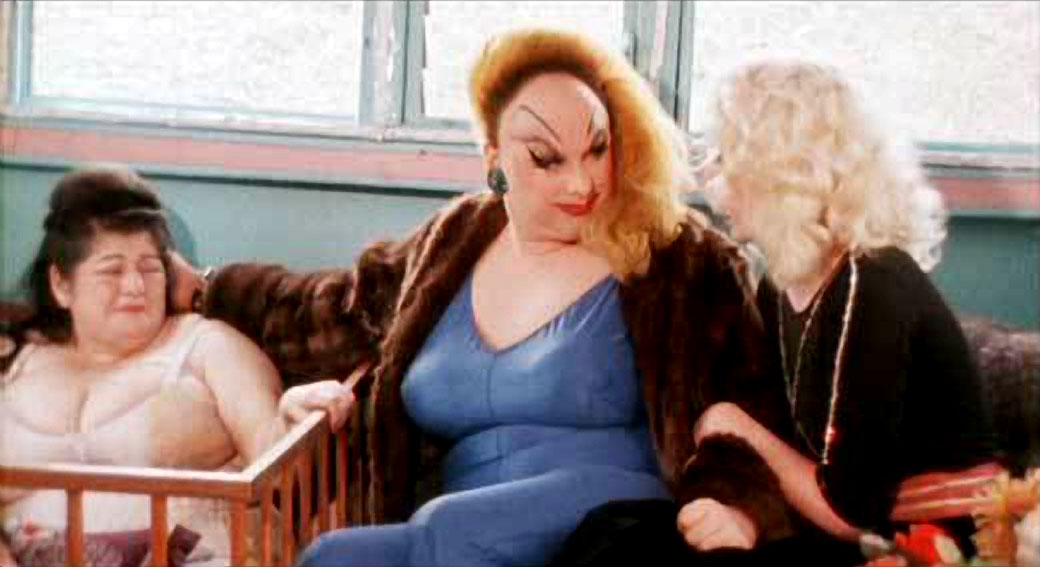Pink Flamingos

John Waters’ Pink Flamingos reached its 40th anniversary recently, and has been screening as part of the BFI’s Uncut strand. While it is not Waters’ early masterpiece, Pink Flamingos is still his most notorious film and it defined his unique, and forever unchallenged, artistic standpoint.
Waters became widely known for his underground “trash” cinema in the 1970s. Waters and his repertory company – the Dreamlanders – made a series of low-budget black comedy-cum-melodramas made and based in Baltimore, Maryland. Inspired by Fellini, Bergman, the Douglas Sirk’s Technicolor melodramas, The Wizard of Oz, Jayne Mansfield, 50s rebel culture and more, Waters’ early films take place in a saturated fantasy, an adult childhood of Baltimore made somewhat possible – but still standing very much outside of – the mainstream counterculture of free love of the late 60s.
Pink Flamingos follows Divine (aka Babs Johnson), her son Crackers (Danny Mills), traveling companion Cotton (Mary Vivian Pearce) and egg-obsessed, playpen-bound mother Edie (Edith Massey). Living together in a trailer, they pride themselves on being “the filthiest people alive”. All is peacefully rotten until Connie and Raymond Marble (Mink Stole and David Lochary) – a bitter married couple who kidnap young women, impregnate them and sell the offspring to lesbian couples – discover Babs’ identity and challenge her for this title.
Divine would give a better performance in Female Trouble, Waters’ best 70s film, but here he remains fabulously charismatic, like a child on Christmas morning living in a filth-queen’s body, relishing the centre-stage. His best scene is a kangaroo court and press conference, featuring his calling-to-arms those who believe in trash (“Kill everyone now! Condone first-degree murder! Advocate murder! Eat shit! Filth is my life!”). David Lochary and Mink Stole are equally good; stroppy and self-obsessed, sucking on each other’s toes and proclaiming “I love you more than my hair colour, more than the sounds of babies crying, more than my own filthiness.”
Performances are straight, just as they should be. This is a living world, we don’t exist within it, and we don’t stand outside looking in, editorialising. Pink Flamingos is as Pink Flamingos does. Much of the film is admittedly slapdash in critical terms. Certain sequences are skittish, continuity is poor, and so on. But this is a film of such purity and humility, of self-reliance and assurance, that these are not issues. You don’t ask, “Why is there a singing anus?” – there is a singing anus and it’s more gleeful than you might’ve expected.
Pink Flamingos in its uncut form is a pleasure to behold, as it is aimed so purely at the enjoyment in imperfection and so-called distaste. What was most encouraging about its BFI screening was the palpable feeling that it is still genuinely transgressive. This lasting impact and shock value may come from the fact that rather than just holding a dog turd in the face of conservatism, Waters’ films – as he has noted – make fun of what liberalism, in all its self-righteousness and acceptance of his films, holds dear.
But without falling into the trap of gentrifying the film with the above words, to put it simply Pink Flamingos is about mockery, recreation and release, in front of and behind the camera, about defining yourself by whatever means feel right, best and most fun.
Nobody has taken up the mantle of Pope of Trash since John Waters, but maybe nobody can.
Stephen Glass
For further information on the BFI’s Uncut season visit their website here.
























Facebook
Twitter
Instagram
YouTube
RSS